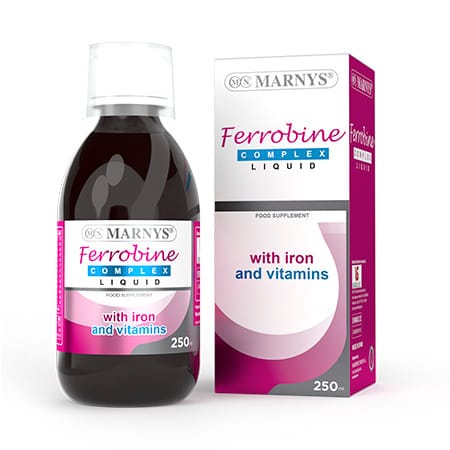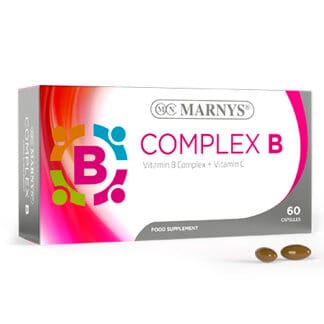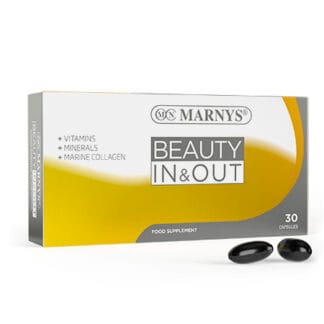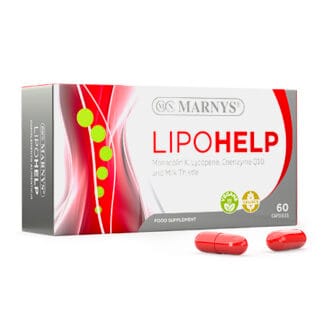Description
MARNYS® Ferrobine Complex is specifically formulated with iron and 12 vitamins to complete your iron levels, an essential element for haemoglobin and cell oxygenation.
MARNYS® Ferrobine Complex contains Iron in the form of Ferrous Gluconate, which is the binding of a glucose derivative to Iron in an oxidised state (II), enabling easier absorption by the intestine. It also provides greater stability to Iron by preventing its decomposition inside the intestinal tube, causing much less gastric irritation than other commonly used inorganic ferrous salts, such as ferrous sulfate (Pérez 2006; Gyurcsik 2000).
MARNYS® Ferrobine Complex and its ingredients provide the following properties:
- Iron contributes to normal synthesis of red blood cells and haemoglobin, the oxygen transport within the body and to normal cognitive function in the development of children (EFSA).
- The Ferrous Gluconate in MARNYS® Ferrobine Complex provides 100% of the recommended dose of iron, once per day.
- Vitamin C contributes to normal formation of collagen in the skin, bones, joints, tendons, cartilage, blood vessels and teeth for their normal functions. It also contributes to normal function of the immune system, as well as to increasing the absorption of iron (EFSA). The source of vitamin C in MARNYS® Ferrobine Complex is L-ascorbic acid and the dietary sources it is obtained from are liver and kidneys, citric fruits such as strawberries, oranges, lemons, grapefruit, kiwi, and vegetables such as pepper, cabbage, radish, broccoli, raw parsley.
- Vitamin A contributes to normal iron metabolism and maintenance of vision. It also participates in the cell differentiation process (EFSA).
- Vitamins B6 and B12 contribute to normal energy-yielding and homocysteine metabolism, red blood cell synthesis and to reduction of tiredness and fatigue (EFSA).
- Niacin and Biotin contribute to normal maintenance of the skin and mucous membranes, and Biotin contributes to normal maintenance of hair (EFSA). Niacin (B3) is found in the following food: lean red meat, poultry and liver as animal sources, and legumes, grains, tea and coffee as vegetable sources.
- Riboflavin and thiamine contribute to normal function of the nervous system. Thiamine also contributes to normal heart function (EFSA).
- Vitamin B9 (folic acid) increases folate levels in pregnant women, since low folate levels are a risk factor in the development of neural tube defects in the foetus (EFSA).
To Know More
Iron, an essential element for your Red Blood Cells
Iron is an essential element, as it is a constituent of a variety of enzymes involved in redox reactions and oxygen supply. Red blood cells have got the highest demand for iron among all cells, approximately more than half of the total body content. The human body contains 30 to 40mg of iron per kg of body weight. It is mainly found in haemoglobin (Hb), ferritin and other haeme proteins (for example myoglobin in muscles) and non-haeme proteins.
Anaemia is considered the most common nutritional deficiency across the globe and in 95% of cases is associated with an deficient iron diet. The World Health Organization (WHO) defines anaemia as the haemoglobin concentration below 13 g/dl in adult men and 12 g/dl in adult non-pregnant women.
The factors determining iron deficiency anaemia are: inadequate diet of iron, micronutrients and vitamins (vitamins B12, folate, A, D); the use of drugs and foodstuffs that inhibit iron uptake; overweight and obesity; malnutrition; athletes, especially adolescents; blood loss; pregnancy and newborns; menstrual abnormalities, etc.
Iron supplements are used to replenish iron stores and restore haemoglobin concentrations to normal levels, thus preventing and treating the symptoms that may arise. The benefits are improved quality of life, physical performance, thermoregulation, cognitive function and immune function.












Reviews
There are no reviews yet.